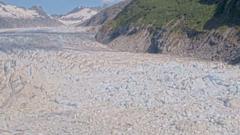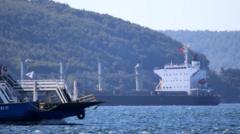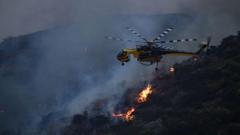As Spain grapples with devastating wildfires fueled by a severe heatwave, the EU steps in with firefighting resources and assistance.
**EU Dispatches Firefighting Aid to Spain Amid Rising Casualties**

**EU Dispatches Firefighting Aid to Spain Amid Rising Casualties**
The European Union has mobilized support to combat severe wildfires in Spain, where the death toll has tragically increased.
The European Union has swiftly responded to the escalating wildfire crisis in Spain by sending two firefighting planes, marking the first activation of the bloc's disaster assistance mechanism by the nation. This assistance arrives as Spain faces its third wildfire-related fatality in a grim update, with fears that the fires may continue to spread further due to ongoing extreme weather conditions. Weather forecasts from Spain’s state agency suggest that the intense heatwave is anticipated to persist until Monday, with temperatures soaring to a scorching 44C in certain regions, exacerbated by moderate winds.
Spain has now joined the ranks of five European nations seeking external help to tackle devastating wildfires. Greece, which has been battling its own crisis, has already witnessed over 25,000 acres engulfed in flames since Tuesday. The French Canadair water bomber aircraft aimed to bolster efforts specifically in the northwestern Galicia region after their arrival on Thursday.
Pedro Blanco, a government representative in Galicia, emphasized the importance of cross-border collaboration, stating, "The fight against fires knows no borders." Spanish Interior Minister Fernando Grande-Marlaska noted that while the planes were not immediately needed, they wished to have them available for rapid deployment.
In a tragic turn, a volunteer firefighter in León succumbed to severe burns on Thursday, marking him as the second volunteer casualty in the region and the third overall in the ongoing crisis. Prime Minister Pedro Sanchez expressed condolences, highlighting the profound loss for the community.
The wildfires have already engulfed over 157,000 hectares of land across Spain this year. Notably, a Civil Guard investigation has resulted in the arrest of two suspects in connection with fires that devastated large areas, raising the total number of arson arrests to ten since early June. Wildfires have a propensity to spark from careless activities such as barbecues or discarded cigarettes, and in Spain, any act leading to a wildfire, intentional or not, can lead to serious legal consequences.
As the situation remains dire, mass evacuations are taking place, with 700 residents from the southwestern province of Caceres ordered to leave their homes on Wednesday. Meanwhile, Portugal has mobilized over 1,900 firefighters to tackle significant blazes, particularly focusing on the central city of Trancoso, where fires have ravaged an estimated 14,000 hectares.
Southern Europe is prone to wildfires during the summer months, but the current heatwave conditions are exacerbating their severity. EU data indicates that around 629,000 hectares across the bloc have burned since the year commenced, with nearly a quarter of that area attributed to Spain. While it can be challenging to directly link climate change to specific weather phenomena, experts agree that climate change is contributing to longer and more intense heatwaves, which can predispose the landscape to wildfires.
Other countries, including Greece, Bulgaria, Montenegro, and Albania, have taken action through the EU's civil protection mechanism, requesting assistance due to their own wildfire challenges. In Greece, ongoing fires have led to significant evacuations and injuries, adding to the urgency for collective regional assistance.
Spain has now joined the ranks of five European nations seeking external help to tackle devastating wildfires. Greece, which has been battling its own crisis, has already witnessed over 25,000 acres engulfed in flames since Tuesday. The French Canadair water bomber aircraft aimed to bolster efforts specifically in the northwestern Galicia region after their arrival on Thursday.
Pedro Blanco, a government representative in Galicia, emphasized the importance of cross-border collaboration, stating, "The fight against fires knows no borders." Spanish Interior Minister Fernando Grande-Marlaska noted that while the planes were not immediately needed, they wished to have them available for rapid deployment.
In a tragic turn, a volunteer firefighter in León succumbed to severe burns on Thursday, marking him as the second volunteer casualty in the region and the third overall in the ongoing crisis. Prime Minister Pedro Sanchez expressed condolences, highlighting the profound loss for the community.
The wildfires have already engulfed over 157,000 hectares of land across Spain this year. Notably, a Civil Guard investigation has resulted in the arrest of two suspects in connection with fires that devastated large areas, raising the total number of arson arrests to ten since early June. Wildfires have a propensity to spark from careless activities such as barbecues or discarded cigarettes, and in Spain, any act leading to a wildfire, intentional or not, can lead to serious legal consequences.
As the situation remains dire, mass evacuations are taking place, with 700 residents from the southwestern province of Caceres ordered to leave their homes on Wednesday. Meanwhile, Portugal has mobilized over 1,900 firefighters to tackle significant blazes, particularly focusing on the central city of Trancoso, where fires have ravaged an estimated 14,000 hectares.
Southern Europe is prone to wildfires during the summer months, but the current heatwave conditions are exacerbating their severity. EU data indicates that around 629,000 hectares across the bloc have burned since the year commenced, with nearly a quarter of that area attributed to Spain. While it can be challenging to directly link climate change to specific weather phenomena, experts agree that climate change is contributing to longer and more intense heatwaves, which can predispose the landscape to wildfires.
Other countries, including Greece, Bulgaria, Montenegro, and Albania, have taken action through the EU's civil protection mechanism, requesting assistance due to their own wildfire challenges. In Greece, ongoing fires have led to significant evacuations and injuries, adding to the urgency for collective regional assistance.




















